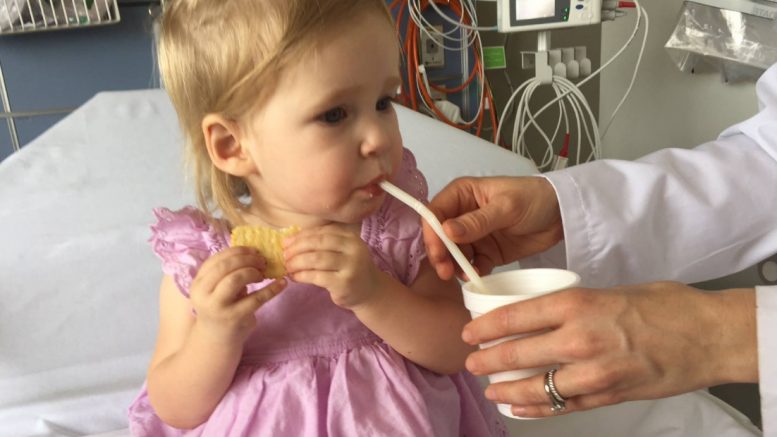A little girl named Marian McGlocklin is originally from Southern California. But these days, the 19-month old is spending time at Chicago’s Rush University Medical Center undergoing treatment for a rare form of Alzheimer’s. Specifically, Marian has “childhood Alzheimer’s.”
According to CBS Chicago:
Marian McGlocklin is already starting to show some symptoms of Niemann-Pick disease type C, says her mother, Sara.
“The possibility of that same little girl one day looking at me and not knowing who I am — it breaks my heart in a million pieces.”
Chicago Rush offers specific treatments for Niemann-Pick type C. The family has to come out to Chicago every two weeks, which has created a financial burden on them. Marian’s mother, Sara, says the treatments may extend Marian’s life, but they will never cure the disease.
For more information, go to the Facebook page Hope For Marian. There is also a Go Fund Me page.
The disease is harsh and heartbreaking. Here are some videos from other parents.
The cause, according to Wikipedia:
Mutations in the SMPD1gene cause Niemann–Pick disease types A and B. They produce a deficiency in the activity of the lysosomalenzymeacid sphingomyelinase, that breaks down the lipid sphingomyelin.[3]
Mutations in NPC1 or NPC2 cause Niemann–Pick disease, type C (NPC), which affects a protein used to transport lipids.[3]
Type D originally was separated from type C to delineate a group of patients with otherwise identical disorders who shared a common Nova Scotian ancestry. Patients in this group are known to share a specific mutation in the NPC1 gene, so NPC is used for both groups. Before the molecular defects were described, the terms “Niemann–Pick type I” and “Niemann–Pick type II” were proposed to separate the high- and low-sphingomyelin forms of the disease in the early 1980s.
Niemann–Pick disease is inherited in an autosomal recessive pattern, which means both copies, or both alleles of the gene, must be defective to cause the disease. “Defective” means they are altered in a way that impairs their function. Most often, the parents of a child with an autosomal recessive disorder are carriers: they have one copy of the altered gene, but are not affected because the other copy produces the enzyme. If both parents are carriers, each pregnancy has a 25% chance of producing an affected child. Genetic counseling and genetic testing are recommended for families who may be carriers of Niemann–Pick.
See the worst states to live in.


Be the first to comment on "Toddler’s Heartbreaking ‘Childhood Alzheimers’"